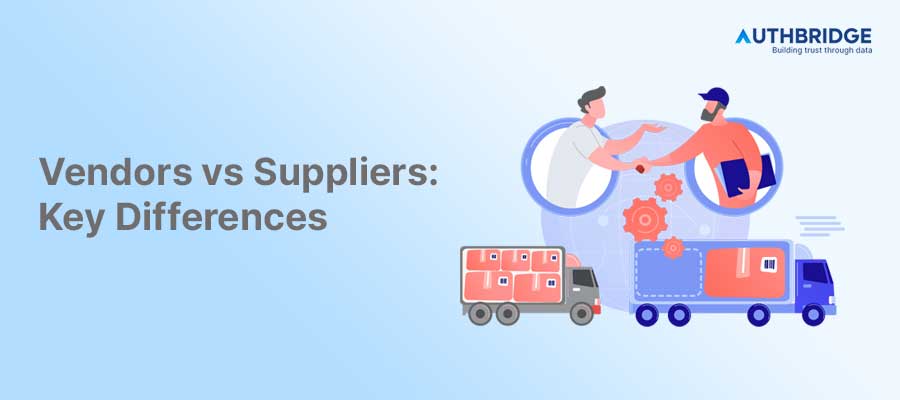Vendors Vs. Suppliers- Key Differences

Introduction
The terms "vendor" and "supplier" are often used interchangeably in business contexts, but they have distinct meanings and roles in the supply chain. Understanding the differences between vendors and suppliers is crucial for effective supply chain management and business operations.
Definition and Role
Vendor:
- Role: A vendor is an entity that sells goods or services directly to the end-users or consumers. Vendors typically deal with finished products ready for sale in the market.
- Function: Vendors are involved in the final stage of the supply chain. They market and sell products to customers, ensuring availability and accessibility.
- Example: A retail store selling clothes, an online marketplace like Amazon, or a local grocery store.
Supplier:
- Role: A supplier is an entity that provides raw materials, components, or services to manufacturers or other businesses. Suppliers are at the beginning or middle of the supply chain.
- Function: Suppliers are responsible for the initial stages of the production process. They supply the necessary materials or components that manufacturers need to create finished products.
- Example: A company providing steel to a car manufacturer, a chemical supplier for a pharmaceutical company, or a textile mill supplying fabric to a clothing factory.
Key Differences
- Stage in the Supply Chain:
- Vendors: Operate at the end of the supply chain, selling finished products to consumers.
- Suppliers: Operate at the beginning or middle of the supply chain, providing raw materials or components to manufacturers.
- Products and Services:
- Vendors: Offer finished goods and services that are ready for consumption or use.
- Suppliers: Provide raw materials, components, or services that are used in the production of finished goods.
- Customer Base:
- Vendors: Serve end-users or consumers directly.
- Suppliers: Serve manufacturers, wholesalers, or other businesses that further process or distribute the products.
- Marketing and Sales:
- Vendors: Focus on marketing and selling products to attract customers and drive sales.
- Suppliers: Focus on building relationships with manufacturers and ensuring a steady supply of materials.
- Example Scenarios:
- Vendor Example: A bookstore selling books to readers.
- Supplier Example: A paper mill supplying paper to the same bookstore for printing books.
Overlapping Roles
In some cases, a business can function as both a vendor and a supplier. For example, a company that manufactures and sells its products directly to consumers and also supplies components to other manufacturers.
Importance in Supply Chain
Vendors:
- Customer Satisfaction: Directly impact customer satisfaction and experience through product availability and quality.
- Market Reach: Play a crucial role in reaching the target market and increasing sales.
Suppliers:
- Production Continuity: Ensure continuous production by providing necessary raw materials and components.
- Cost Management: Influence production costs and quality of the final product.
FAQs on Vendors and Suppliers
1. Can a business be both a vendor and a supplier? Yes, a business can serve as both a vendor and a supplier. For example, a company that manufactures and sells finished goods to consumers can also supply components to other manufacturers.
2. How do vendors and suppliers impact the supply chain? Vendors impact the supply chain by ensuring that finished products are available to consumers, thus driving sales and customer satisfaction. Suppliers ensure that manufacturers have the necessary raw materials and components to produce finished goods, impacting production continuity and costs.
3. What is the main difference between a vendor and a supplier? The main difference lies in their position in the supply chain. Vendors sell finished products directly to consumers, while suppliers provide raw materials or components to manufacturers and other businesses.
4. Why is it important to differentiate between vendors and suppliers? Differentiating between vendors and suppliers helps businesses manage their supply chain more effectively. It allows for better relationship management, pricing strategies, and inventory control.
5. How do businesses choose vendors and suppliers? Businesses choose vendors and suppliers based on various criteria, including quality, price, reliability, and the ability to meet specific requirements. The selection process often involves negotiations and evaluations to ensure the best fit for the business's needs.

Abhinandan Banerjee
(Associate Manager - Marketing)
Abhinandan is a dynamic Product and Content Marketer, boasting over seven years of experience in crafting impactful marketing strategies across diverse environments. Known for his strategic insights, he propels digital growth and boosts brand visibility by transforming complex ideas into compelling content that inspires action.



